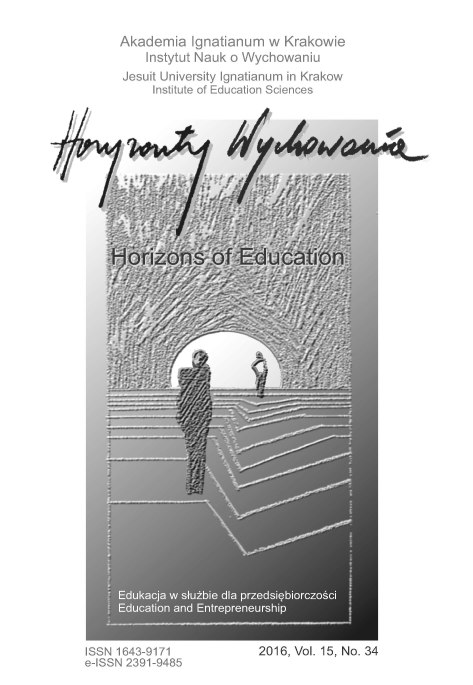Konstruktywizm edukacyjny w nauczaniu przedsiębiorczości metodą gier elektronicznych
Constructivism in teaching enterpreneuership with the use of virtual games
Author(s): Aleksandra Gaweł, Anna Wach-KąkolewiczSubject(s): Education, Higher Education , Educational Psychology, Organizational Psychology, Sociology of Education
Published by: Uniwersytet Ignatianum w Krakowie
Keywords: constructivism; Kolb’s learning cycle; entrepreneurship education; virtual strategic games; teaching;
Summary/Abstract: Research objective: The aim of the paper is to demonstrate the importance of virtual strategic games in teaching entrepreneurship in the context of planning and teaching classes in accordance with the constructive learning theory. The research problem and methods: The paper is based on a case study. The authors present virtual strategic games which were developed as a result of two international teaching projects. Referring to the assumptions of the constructive learning theory (J. Piaget, L. Wygotski, J. Bruner) and to D. Kolb’s concept of experiential learning, the authors discuss the use of electronic games as a teaching method and indicate that it is possible to teach an entrepreneurship course in accordance with the principles of constructive. The process of argumentation: The article begins with the description of the characteristic features of teaching entrepreneurship, which, in principle, should promote pro-active and creative attitudes. Next, learning by doing is discussed, and it is pointed out that activating teaching methods, including electronic games, are proper educational strategies nowadays. The premises of the constructive paradigm in relation to the specific nature of entrepreneurial education are presented in the next section, which is followed by an overview of David Kolb’s learning cycle that provides the framework for designing a teaching process. In the next section, the constructive proposal of teaching classes with the application of the method of electronic games is discussed. Research results: The analysis of the use of electronic games in entrepreneurial education shows that this method has become a part of student-centered educational theories and concepts. Games activate students’ pre-know ledge and involve them in an all-round way. They facilitate team learning and make students reflect while acting and reflect on their actions. They also make it possible to apply new solutions and allow learners to experience and construct knowledge individually in a social context. Conclusions, innovations and recommendations: The argumentation presented in the paper puts emphasis on several issues. Firstly, entrepreneurial education should involve activating educational strategies. Secondly, university education should be student-centered and should engage students’ multi-level activity. Thirdly, the electronic games under study are an interesting constructive teaching proposal for teachers of entrepreneurship. They may also be a source of inspiration for all teachers who seek unconventional solutions in academic education.
Journal: Horyzonty Wychowania
- Issue Year: 15/2016
- Issue No: 34
- Page Range: 87-102
- Page Count: 16
- Language: Polish

